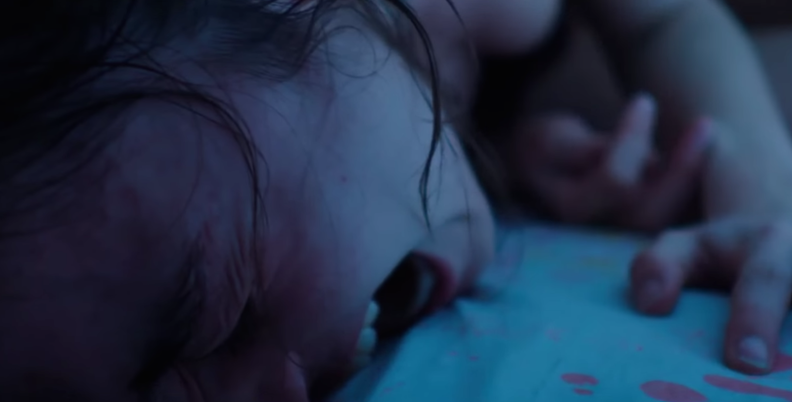The MPA ratings descriptor for Raw is an instance of the anonymous panel making a moral judgment on a film. “Aberrant behavior” leads the lengthy list of material supposedly unsuitable for those under 17. Jennifer Lynch’s Surveillance earned an R rating, at least in part, due to “a scene of aberrant sexuality” several years prior.
In Kirby Dick’s sort-of documentary on the U.S. ratings system, This Film is Not Yet Rated, filmmakers and indie studio heads spoke of the then-MPAA acting as some omniscient parent, determining what is and isn’t appropriate for certain age groups. The commentators (including John Waters and Kevin Smith) rallied around hypocrisy and, if I recall correctly, subjective perspectives on what constitutes “normality.”
It’s no coincidence that Raw plays into this on a greater thematic level. Writer-director Julia Ducournau’s 2016 feature debut is all about challenging societal norms, whether it be the function of women in the modern world, the fluid sexuality of young people on the cusp of adulthood, or the influence of nature versus nurture. With no small bit of irony, the film begins and ends with a finger pointed in the direction of parents who are either overbearing or apathetic.
Hazing Hell
Justine (Garance Marillier), whose name portends a De Sade-ian innocent succumbing to corruption, is a strict vegetarian headed to the veterinary college her nameless parents graduated from, and her sister Alexia (Ella Rumpf) is currently attending. An imposing, run-down façade greets the characters, and within minutes of being dropped off, Justine is caught in a gauntlet.
In a case of the inmates running the asylum, the upperclassmen subject the incoming freshmen to all manner of hazing hell, but the act that begins Justine’s metamorphosis from timid wallflower to unassuming predator is the consumption of a raw rabbit kidney. Meanwhile, Ducournau’s approach to the campus setting recalls Rene Daalder’s Massacre at Central High, where administrative staff were non-entities in the lives of their students.
But that’s not entirely the case here. An old, frizzy-haired male professor sits in judgment of Justine and her status as the daughter of “legacy” students. Some brief yet incisive passages depict Justine’s mother (Joana Preiss) as a helicopter parent to her seemingly helpless daughter. And the ending suggests that, if left unchecked, children can end up inheriting the problems that originated with their parents.
More than Meets the Eye
There are moments in Raw where characters’ actions and motivations don’t seem to add up. While a surface examination would suggest this to be true, Ducournau’s script grows richer and more revealing with subsequent viewings.
Many horror films exist only to shock, and as the shock value wears off, we realize just how flimsy all the other elements are. For example, despite the cultural commentary some have tried to attach to the Hostel films, their end-all, be-all is to push the boundaries of what can be shown in an R-rated movie.
With Raw, the opposite occurs: the further we get from the brilliantly calculated shocks of Justine’s first foray into cannibalism, a cringeworthy bikini wax, and one of cinema’s most gag-worthy “hairballs,” the more the various thematic threads rise to the surface.
The Transition of Identity
While Alexia has ascended to the lab-coated, cult-like group that runs roughshod over the freshman, she remains a case study in choosing conformity at the expense of identity. Despite her bullying nature toward Justine in the early going, wrinkles in her personality suggest she was in that exact same spot at one time.
The alternating displays of affection and venom between the two sisters could be called out as inconsistent writing. But Justine and Alexia are not unlike the Fitzgerald Sisters in Ginger Snaps – hopelessly devoted to each other until womanhood and lycanthropy enters the picture.
During the scenes where Alexia criticizes Justine’s waifish manner, to the show-stopping encounter where the sisters (literally) savagely attack each other, to the moment Justine bathes the too-far-gone Alexia, the paradoxes of emotion and pathology ring true. Sibling rivalry is one thing – but the pull of acceptance by “the herd” is something else altogether. Combine the two, and what’s left is the choice of retaining one’s identity, or assimilating in the name of elevated social status.
By Raw’s end, the whirlwind of emotion and personal sacrifice Justine and Alexia have undergone is melancholy yet appropriate. And despite the sunlit moment where Justine speaks with her father (Laurent Lucas), in the deceptively idyllic dining room of the family home, the film concludes on a cruel punchline that suggests the sisters’ fates were written long before they developed a conscience.
Suggestions of Savagery
While Ginger Snaps remains one of horror’s ultimate coming-of-age tales (in no small part because of its brilliant metaphorical correlation between the onset of womanhood and the transformation of lycanthropy), Raw isn’t far behind.
I questioned the moment where Justine’s openly gay roommate, Adrien (Rabah Nait Oufella) gives her a window to lose her virginity during a memorably uncomfortable sex scene. His later actions come across as defensive, to the point where one wonders if he’s a fence-sitter looking to play both sides of the sexual coin. The deflowering scene is shot like a modern zombie film, wherein a pinned individual is looking to keep hungry jaws off their uninfected flesh.
As part of the opening hazing ritual, the freshmen are made to crawl on hands and knees until they arrive at a drug-fueled mixer. Ducournau shoots this sequence like something out of Salo, with young physical forms emerging from darkness; it takes a few moments before we understand what’s happening. And with the party comes a seemingly shot where petite Justine is jostled from one room to the next, going unnoticed until she catches sight of Alexia.
But Raw captures the horror zeitgeist when Alexia, who’s infiltrated the life of Justine and Adrien, begins to lash out. A later party sequence has Justine recorded on someone’s camera phone in a morgue, taunted by Alexia as she snaps her jaws at a cold, clammy hand. The unsubtle discomfort of the classmate Justine sits next to the morning after is a brilliant, gut-clenching moment of impending confrontation and fear.
Family Dynamic
While Ari Aster uses family as a backdrop or catalyst for horror, his films seem less interested in family as a theme than a vessel for superficial art-house shock. By hammering on the topic for two-and-a-half hours, the end result is less than meets the eye.
In Raw, Ducournau relegates Justine’s mother and father to brief scenes at the beginning, middle, and end. The characters are distinctive, but do not drive the narrative – mother is overbearing and father is withdrawn. By not giving them a greater visual presence, they still become the omnipresent influence on the events that transpire.
Indeed, everything Justine and Alexia experience falls at their parents’ feet. The father’s admonition to the former that “I hope you find a solution” is another infuriating case of parents pushing off their hopes for the future on their children. In other words, “maybe you’ll un-fuck everything we’ve fucked up.”
To that end, is there hope? Ducournau captures a look of maturity in Justine’s face that suggests her time in the gauntlet and the horrors she’s experienced (and perpetuated) have brought her out the other side wiser and less naïve.
But there’s plenty of ambiguity in that final scene, to the point where one could easily imagine Justine returning for a sequel that fills in not only her story, but the story of the messed-up parental units who created her. To quote Repo! The Genetic Opera: “I’m infected…by my/your genetics!”
Jonny Numb (aka Jonathan Weidler) is a TV dinner in a farm-to-table world. He co-hosts The Last Knock podcast with Billy Crash, and his writing can also be found at The Screening Space. Go to @JonnyNumb on Twitter and Letterboxd for more succinct and succulent takes on the state of the world and cinema.


